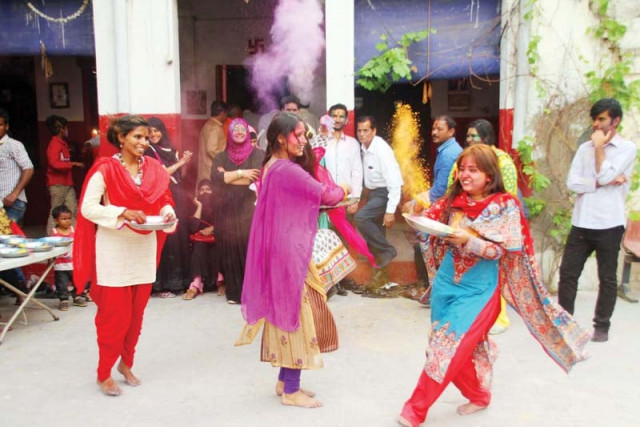Of pigments and rejoicing: A triumph of good over evil
Holi celebrations held across the province on Wednesday and Thursday

Rangwali Holi festivities at Balmiki Mandir, Lahore, on Thursday. PHOTOS: ABID NAWAZ/EXPRESS
Holi is a reminder of the victory of virtue over evil, Aroon Kumar, who was moderating Holi celebrations at Krishna Mandir on Thursday, said. “It’s a festival of colour and sharing love.”
Thursday marked the second day of Holi celebrations. The rituals began at Krishna Mandir, Ravi Road, on Wednesday night with Holika Dahan – a pyre symbolising Holika, a demon spirit, alight. The bonfire symbolises triumph of good over evil. Rangwali Holi – a fiesta of colour and happiness – followed at Balmiki Mandir at Neela Gumbad on Thursday morning.
Scores of Sikhs, Christians and Muslims joined in the Holika Dahan at Krishna Mandir on Wednesday where Dr Manwar Chand, chairman of the Pakistan Hindu Welfare Council (PHWC), led the proceedings. Other leaders of the Sikh and Hindu communities, and Evacuee Trust Property Board Secretary (Shrines) Khalid Ali attended the celebrations.
“On Holi, we vow to put an end to any estrangements or grudges we might have harboured throughout the year and promise to follow the path of virtue throughout the coming year,” said Kumar.
Amarnath Randhawa, a Hindu Sudhar Sabha, lamented that they could not celebrate Holi out in the open because of growing religious intolerance and had to hold various rituals indoors.
On Thursday, Bhagat Lal, pundit at Balmiki Mandir, welcomed the participants. Food was distributed among the visitors by the Krishna Mandir’s management and the Evacuee Trust Property Board’s administration. Chand said Holi marked the arrival of spring season. “Its message is of love, peace and brotherhood…it asks us to end differences and to strive for harmony and peace among people of all faiths.”
As the celebrations kicked off, participants sang bhajans and danced well into the day.
The district administration of Bahawalpur distributed cheques under a Holi Grant programme among 94 Hindu women in Bahawalpur district. The cheques were distributed at the committee room of the DCO’s office on Thursday.
DCO Ehtesham Anwar, who was distributing the cheques, said minorities in Pakistan were equal citizens of Pakistan and they equally shared the responsibility of developing the country.
The district administration had drawn up the list of widows and financially-distressed Hindu women from Bahawalpur, Ahmedpur East, Yazman tehsil and Hasilpur tehsil, to receive cheques for Rs5,000 each.
Additional District Collector Imrana Ajmal, DOC Chaudhry Amjad Basheer and AC City Rao Tasleem Akhtar were present at the ceremony. Sarpanch Sardar Tufail Jhajot and Parvaiz Ram, representing the Hindu community, were also present.
The DCO said 33 Hindu women from Bahawalpur, 32 women from Ahmadpur East, 28 from Yazman tehsil and one woman from Hasilpur tehsil had been given cheques of Rs5,000 rupees.
The DCO also announced a special holiday on Holi for Hindu employees of the government.
The festival of colour was celebrated in several other districts of south Punjab including Layyah, Khanewal, Dera Ghazi Khan and Multan.
Pundit Ashok Lal of Multan explained that the pyre burned as a symbol of Holika carried dung cakes and wood sticks to fuel the flames. Rangwali Holi is when handfuls of gulal (coloured powder) are thrown in the air and at one another to celebrate the end of Holika. “Everyone chases others throwing colour around…it’s quite the raucous affair.”
In his message to the Hindu community, Chief Minister Shahbaz Sharif offered his felicitations and said Pakistan’s religious minority communities had the freedom to practice their faith in a befitting manner. The protection of holy places, irrespective of religion, is a responsibility the government takes very seriously, he said. “We have taken several steps to ensure the protection of minorities’ rights.” Members of various faiths came together to create Pakistan, he said. “They have an equal share in the country’s progress.”
Celebration: The story of Holi
Holi is a two-day festival which starts on the Purnima (full moon) in the Bikram Sambat Hindu calendar’s month of Falgun, which falls between the end of February and mid of March. The first day is known as Holika Dahan or Chhoti Holi and the second day is Rangwali Holi or Dhuleti.
People gather around the Holika Dahan pyre, sing bhajans and dance. On Dhuleti, people gather with their family and friends to throw gulal on each other, laugh and gossip and partake in Holi delicacies, food and drinks.
According to Hindu faith, the word Holi originates from Holika, the evil sister of the king Hiranyakashipu.
King Hiranyakashipu had demanded that everyone worship him. Hiranyakashipu’s own son, Prahlada, however, disagreed. He was and remained devoted to Lord Vishnu. This infuriated Hiranyakashipu who subjected Prahlada to cruel punishments, none of which affected the boy.
Finally, Holika – Prahlada’s evil aunt - tricked him into sitting on a pyre with her in which she burned but Prahlada survived. Seeing this, Hiranyakashipu smashed a pillar with his mace and Lord Vishnu appeared as Lord Narasimha and killed Hiranyakashipu. The next day when the fire cooled down, people applied ash to their foreheads, a practice still observed by some people. Eventually, coloured powder came to replace the ash to celebrate Holi.
Published in The Express Tribune, March 25th, 2016.



















COMMENTS
Comments are moderated and generally will be posted if they are on-topic and not abusive.
For more information, please see our Comments FAQ